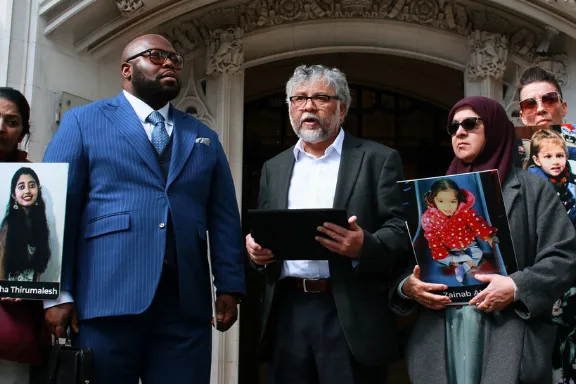A Supreme Court ruling that will make it harder for clinicians involved in sensitive and controversial end-of-life care cases to be granted indefinite anonymity has been labelled as “worrying” by nursing leaders.
This week, judges at the highest court of appeal affirmed that health professionals involved in the withdrawal of life support from critically ill children could only have their identities permanently protected in “compelling circumstances”.
“The decision has the potential to add additional pressures to what can be very challenging situations”
Joanne Galbraith-Marten
The ruling marked the conclusion of a seven-year legal battle between two families and the NHS trusts that treated their children.
Zainab Abbasi was born in 2013 with a rare neurodegenerative disease and was under the care of Newcastle upon Tyne Hospitals NHS Foundation Trust.
The trust had applied to court to withdraw life-sustaining treatment to Zainab, arguing that it was in her best interest.
However, Zainab died in September 2019, before a decision was made.
Meanwhile, Isaiah Haastrup was left dependent on intensive care at King’s College Hospital NHS Foundation Trust after suffering oxygen deprivation at birth due to clinical negligence.
He died in March 2018, aged one, after life support was withdrawn.
In both cases, injunctions were issued that indefinitely prevented the clinicians involved in Zainab and Isaiah’s care from being publicly named.
The parents of the children have been fighting for these injunctions to end so that they can tell their stories and name individuals who they felt did wrong.
The trusts, however, have sought to maintain the injunctions to protect clinicians from the risk of abuse and harassment.
Giving their judgement yesterday, Supreme Court judges determined that the naming restrictions on the clinicians should be lifted.
They said any restriction of freedom of expression must be “established convincingly”, which they felt had not been done in these two cases.
Going forward, such injunctions should only be granted for a “limited” and “reasonable” duration, they concluded.
They suggested that a reasonable duration would be until the end of legal proceedings and then a “cooling-off period”.
Any application for an extension beyond the cooling-off period would need to be “supported by specific evidence”, and a request for permanent anonymity would require “compelling circumstances”, ruled the Supreme Court.
The Royal College of Nursing (RCN) took part in the case as a third-party ‘intervenor’, speaking in support of clinicians.
Reflecting on the ruling, RCN executive director of legal and member relations, Joanne Galbraith-Marten, said: “Today’s decision will be disappointing and worrying for those involved in critical treatment choices and end-of-life care.
“The decision today has the potential to add additional pressures to what can be very challenging situations.
“We will take time to fully understand the implications of the judgment of the Supreme Court for our members and the impact on their rights in these very difficult circumstances.”
“We have lost our children and they cannot be brought back”
Lanre Haastrup
Speaking outside the Supreme Court, Zainab’s father Dr Rashid Abbasi – who is a doctor himself alongside his wife Dr Aliya Abbasi – welcomed the judgement.
He said: “We were brutally silenced both before and after Zainab’s death.
“Now, after six years of fighting in courts, we are finally allowed to tell our story.”
He said the family would continue to be “fair and responsible” in their criticism of Zainab’s care but would be looking to name the clinicians who they felt failed in their duties.
“It is extremely unfair that, while the real culprits hide behind the court-imposed anonymity, the entire medical profession is painted with the same brush in the eyes of the public,” he added.
“Today’s judgment will hopefully put a stop to this unfairness, and by identifying the bad apples, protect the reputation of our profession as a whole.”
Meanwhile, Isaiah’s father Lanre Haastrup said, now that naming restrictions had been lifted, he would be writing a comprehensive book about what happened in his son’s case.
“Today’s judgment is the important first step towards achieving justice for our beloved Isaiah, for Zainab Abbasi and for other children like them,” he added.
“We have lost our children and they cannot be brought back, but if we leave this system in a better shape than we found it, we will know our children have not died in vain.”
A spokesperson for King’s College Hospital said it accepted the ruling of the Supreme Court and would “continue to support our staff through this change”.
“We remain sincerely sorry for the events surrounding Isaiah’s birth,” they added.
Similarly, a spokesperson for Newcastle upon Tyne Hospitals said it was “grateful to the Supreme Court for their considered judgement”.
“Throughout these proceedings, we have sought to act in the best interests of patients whilst protecting the rights of our staff to go about their professional duties and private lives without the potential threat of abuse or harassment,” they added.
“This judgement helpfully clarifies a number of areas of law. It also confirms that it was appropriate and reasonable for the trust to take this action.
“We will now take some time to consider the judgement. We continue to extend our condolences to Zainab’s family.”
More on end-of-life and palliative care

